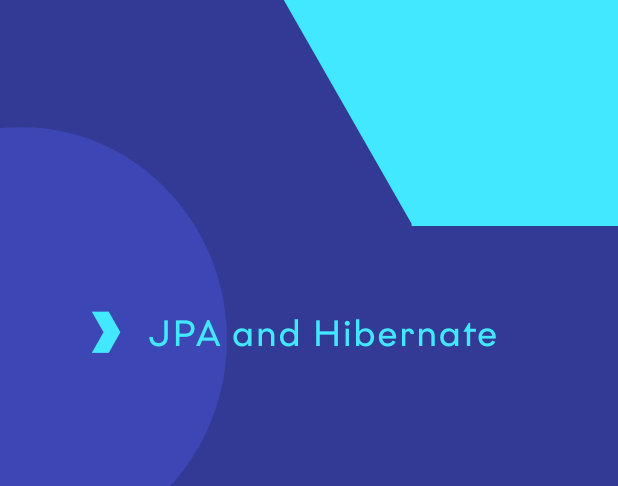Master object–relational mapping in Java with a course that blends theory with hands-on coding. Using JPA v3 and Hibernate v6, you’ll learn to store Java objects in relational databases, streamline data handling, and model complex entity relationships for enterprise-scale applications.
JPA and Hibernate
Select your learning method

Master java ORM for real-world impact
Over three comprehensive days, this JPA and Hibernate course shows Java developers how to build robust, efficient applications. You’ll work with object mapping, query creation, and performance tuning, gaining practical skills that can add immediate value to enterprise development projects.
- Install and set up Hibernate
- Connect Java classes to tables
- Execute core CRUD operations
- Manage entity states effectively
- Model complex object links
- Implement inheritance mappings
- Write effective HQL
- Use JPA’s EntityManager
- Improve ORM performance
What you’ll learn
Gain hands-on experience applying JPA and Hibernate in live Java projects - from setup to advanced mapping and performance techniques. By the end, you’ll be confident in managing persistence and crafting effective HQL.
Composite and inheritance mapping
Learn how to model complex data relationships and class hierarchies in Hibernate. You’ll explore one-to-one, one-to-many, and many-to-many associations, understanding when to use unidirectional or bidirectional mapping. This module covers cascading operations, fetch strategies, and techniques for avoiding the common n+1 select problem. You’ll also map inheritance using single table, joined table, and table-per-class strategies, enabling efficient queries and streamlined database structures for enterprise-scale Java applications.
HQL and JPQL queries
Gain the skills to write effective, optimised queries using Hibernate Query Language (HQL) and Java Persistence Query Language (JPQL). You’ll create parameterised statements, work with joins, and apply ordering and grouping to extract exactly the data you need. Learn when to use eager fetching and how to combine native queries for advanced scenarios. This module ensures you can interact with databases cleanly, efficiently, and in a way that’s portable across different systems.
Performance tuning strategies
Understand how to identify and address performance bottlenecks in Hibernate-based applications. You’ll examine fetch types, query-specific fetching, and how to use sets instead of lists for certain mappings to improve speed. Learn the benefits of first- and second-level caching, and when to let the database handle heavy operations. By applying these techniques, you’ll ensure your Java applications run efficiently, even with complex data models and high transaction volumes.
- Three days of expert-led virtual training
- Practical sessions in a live lab environment
- Downloadable course materials and exercises
- A certificate confirming attendance and skills gaines
Key facts
Java professionals who want to design maintainable, scalable data access layers using ORM techniques in real-world projects.
You should be a confident Java programmer, with experience using JDBC, I/O, and Collections.
Our experienced trainers and interactive labs create a focused, practical environment – so you can put theory into practice from day one.
FAQs
This course teaches Java developers how to apply ORM frameworks for effective persistence, efficient querying, and performance tuning in enterprise-grade applications.
What version of Hibernate and JPA does this course use?
This course is delivered using Hibernate version 6 and JPA version 3. These are the most current, stable releases used in enterprise development today and reflect industry best practices for modern ORM implementation.
Will this course help me prepare for Java enterprise roles?
Yes. The skills covered, like object-relational mapping, entity management, HQL, and performance tuning, are foundational for working in enterprise Java environments and are highly sought after in back-end development roles.
How much practice is included in this course?
A large portion of the course is devoted to hands-on exercises. You’ll write code, perform mappings, optimise performance, and query databases, applying what you learn in realistic scenarios throughout the three days.
Is there a certification or exam with this course?
While there is no formal exam, you’ll receive an ILX certificate of completion. This recognises your achievement and can be a valuable addition to your professional development portfolio or CV.
Can I use the skills learned with other JPA providers besides Hibernate?
Absolutely. While the course uses Hibernate as the implementation, the core principles and practices apply to any JPA-compliant provider, making the skills transferable across projects and technologies.
What our customers say

“I have taken a number of virtual training courses over the years, and I have to say this one was the best, delivery-wise. Stuart was engaging and explanatory, extremely patient and no question seemed unimportant or ridiculous.”

“John made the subject matter interesting. The pacing was spot on, and he clearly knew what he was talking about and was able to communicate that easily. Very pleased and would highly recommend.”
Join the half a million learners developing their skills with our training
A trusted partner to thousands of organisations worldwide
Our passionate team goes above and beyond to support customer needs
Please complete the form to ensure your quote is accurate and we will contact you soon.